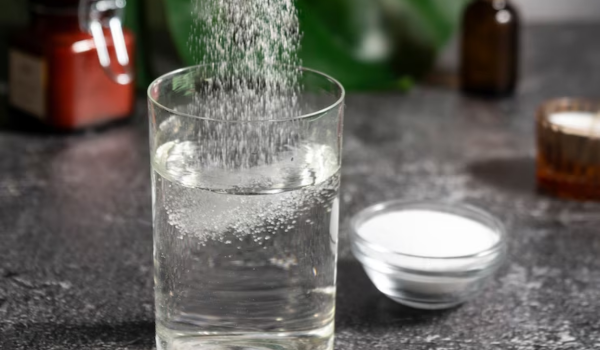7-Second Salt Water Trick for Weight Loss: Truth & Tips
7-Second Salt Water Trick for Weight Loss: Fact, Fiction, and Safe Ways to Shed Pounds Naturally

In today’s world, weight loss remains one of the most sought-after health goals. With countless diets, supplements, and fitness trends circulating daily, it’s easy to become overwhelmed by conflicting advice.
One recent buzz-worthy remedy is the “7-second salt water trick for weight loss.”
Promoted across social media platforms and health forums, this quick and seemingly simple technique promises rapid fat burning and improved metabolism by just drinking salt water in a specific way within seven seconds.
But is this method truly effective, or just another health myth?
In this comprehensive blog post, we’ll unpack the 7-second salt water trick for weight loss, evaluate its scientific credibility, explain how salt and hydration impact weight management, and guide you toward evidence-based strategies that truly work.
What Is the 7-Second Salt Water Trick for Weight Loss?
The “7-second salt water trick” involves mixing a small amount of salt in a glass of water and drinking it quickly, usually within seven seconds. Advocates claim that this practice:
- Boosts metabolism
- Enhances digestion
- Suppresses appetite
- Promotes fat loss
- Detoxifies the body
The allure? It’s quick, natural, and doesn’t require expensive supplements or strenuous exercise. However, most of the evidence supporting this trick is anecdotal or anecdotal mixed with misinformation.
The Origin and Popularity of the Salt Water Trick
The idea of using salt water for health benefits is not new. Saltwater rinses have been used traditionally for oral health, and salt baths have therapeutic uses.
In weight loss, some believe that “detoxifying” with salt water flushes toxins and improves gut health.
The “7-second” component drinking the salt water rapidly is likely a modern marketing twist, designed to make the remedy seem scientific and unique.
Social media platforms have amplified the trick’s popularity, where influencers and health enthusiasts share personal success stories, encouraging thousands to try it.
The Science Behind Salt and Weight Loss: What Does Research Say?
Salt and Hydration
Sodium, the key mineral in salt, regulates fluid balance in the body. Proper hydration is crucial for:
- Optimal metabolism
- Digestion
- Kidney function
- Energy levels
Drinking water, in general, can aid weight loss by improving metabolism and reducing calorie intake when consumed before meals.
But Does Salt Water Aid Weight Loss?
Salt and water intake must be balanced. Consuming too much salt can lead to fluid retention, bloating, and increased blood pressure, which contradicts weight loss goals.
Salt water is not a fat-burning agent. There is no scientific evidence that drinking salt water directly promotes fat loss.
Detoxification and Salt Water
The body’s liver and kidneys handle detoxification efficiently without any special drinks. The claim that salt water “flushes toxins” is not supported by clinical studies.
Potential Risks of the 7-Second Salt Water Trick
1. Excessive Sodium Intake
High salt consumption can contribute to:
- Hypertension (high blood pressure)
- Kidney damage
- Increased risk of cardiovascular diseases
2. Dehydration Risk
- Drinking salt water without adequate plain water may dehydrate the body, as salt can pull water out of cells into the bloodstream.
3. Gastrointestinal Issues
- Salt water may irritate the stomach lining, causing nausea or discomfort in sensitive individuals.
Does Timing Matter? What’s the Significance of 7 Seconds?
There is no scientific rationale behind the seven-second rule. Drinking water quickly or slowly will not significantly alter how salt affects your body or weight.
Healthy Alternatives: Evidence-Based Strategies for Weight Loss
If you want to lose weight safely and effectively, here’s what science supports:
- Balanced Diet: Focus on: Whole foods: vegetables, fruits, lean proteins, whole grains, Avoid processed foods high in sugar and salt, Control portion sizes
- Regular Exercise: Aerobic and resistance training boost metabolism, burn calories, and build muscle.
- Hydration with Plain Water: Drink enough water daily. Staying hydrated supports metabolism and reduces hunger.
- Adequate Sleep: Sleep deprivation disrupts hunger hormones and can promote weight gain.
- Stress Management: Chronic stress raises cortisol levels, linked to abdominal fat accumulation.

When Is Salt Intake Beneficial?
Moderate salt intake is necessary for:
- Maintaining blood pressure
- Nerve and muscle function
For most adults, the recommended sodium intake is less than 2,300 mg per day (about one teaspoon of table salt).
What Role Does Water Play in Weight Loss?
Water supports weight loss by:
- Increasing feelings of fullness
- Enhancing metabolism temporarily
- Helping the body efficiently burn fat
A landmark study showed drinking 500 ml of water increased metabolic rate by 30% for about 30-40 minutes.
Practical Tips: How to Incorporate Salt and Water Into a Healthy Routine
- Use iodized salt sparingly while cooking.
- Drink 8–10 cups of plain water daily, more if exercising.
- Consider electrolyte drinks only if sweating heavily or dehydrated.
- Avoid high-sodium processed snacks and fast food.
Common Myths About Salt Water and Weight Loss
Myth 1: Salt Water Flushes Fat
False. Fat loss requires burning more calories than you consume; salt water alone does not burn fat.
Myth 2: Drinking Salt Water Speeds Up Metabolism
No credible evidence supports this claim.
Myth 3: Salt Water Detoxifies the Body
Your kidneys and liver detoxify naturally; salt water is unnecessary.
Is the 7-Second Salt Water Trick Worth Trying?
The 7-second salt water trick for weight loss is largely a myth without scientific backing. It may even pose health risks if salt intake is excessive.
Sustainable weight loss requires lifestyle changes: balanced nutrition, physical activity, hydration with plain water, and good sleep.
We promote safe, evidence-based health solutions tailored to your unique needs. If you’re struggling with weight loss or want to explore medically supervised options, contact our expert team today.
Frequently Asked Questions (FAQs)
Can drinking salt water help me lose weight faster?
No, there is no scientific proof that salt water directly causes weight loss.
How much salt should I consume daily?
The American Heart Association recommends less than 2,300 mg of sodium daily.
What’s the best way to stay hydrated for weight loss?
Drink plenty of plain water throughout the day, and hydrate more during exercise.
Can salt water make you lose belly fat specifically?
No. Spot reduction is a myth. Fat loss happens systemically through calorie deficit and exercise.
Is it safe to drink salt water daily?
Generally no. Excessive salt can cause serious health problems.
What’s a good alternative to salt water for detox?
Drinking plenty of plain water, eating fiber-rich foods, and maintaining kidney and liver health through balanced nutrition.
Can Salt Water Help Suppress Appetite?
One argument for the salt water trick is that it suppresses appetite, reducing calorie intake.
The Science of Appetite Suppression and Salt
Salt tends to increase thirst, not reduce hunger. Sometimes, salty foods make people drink more water, which can help with feelings of fullness.
However, drinking salt water rapidly is unlikely to make you feel less hungry. If anything, high sodium can make people crave sugary or fatty foods due to taste preferences.
The Difference Between “Water Weight” and Fat Loss
When people see quick drops on the scale, it’s often water weight the body’s fluid content rather than true fat loss.
- Salt causes the body to retain water, which can lead to bloating and weight gain on the scale.
- Reducing salt intake causes water loss, which might lower scale weight quickly but not fat.
The 7-second salt water trick may cause fluctuations in water weight but does not lead to sustainable fat loss.
The Importance of Gut Health and Hydration
A healthy digestive system plays a key role in weight management.
- Water helps digestion and prevents constipation.
- Salt, in moderation, supports digestive enzymes and stomach acid production.
Drinking water plain, not salty before meals can promote satiety and reduce calorie intake, contributing to weight loss.
Salt Water and Detoxification: What You Need to Know
Many quick-fix remedies claim “detox” benefits, including salt water.
How Does the Body Detox?
- The liver filters toxins from the blood.
- The kidneys filter waste through urine.
- The intestines eliminate waste through stool.
Drinking salt water doesn’t speed up this natural detox process and may burden the kidneys if consumed excessively.
A Balanced View: When Salt Water Might Be Helpful
There are a few specific scenarios where salt water has medical or health benefits:
- Oral Rehydration Solutions: These are specially formulated salt and sugar water mixtures used to treat dehydration from diarrhea or illness.
- Salt Water Gargle: Helpful for sore throats or mouth infections.
- Salt Baths (Epsom Salt): Used for muscle relaxation and skin benefits.
None of these uses are directly linked to weight loss.
How to Spot Health Myths Online: A Quick Guide
With trends like the 7-second salt water trick, it’s important to critically evaluate health claims:
- Check for scientific evidence — Are there clinical studies or expert reviews?
- Beware of miracle claims — Rapid weight loss promises are often unrealistic.
- Consult credible sources — Medical organizations, registered dietitians, and physicians.
- Look for balanced advice — Healthy weight loss is a gradual process.
What Does Real, Sustainable Weight Loss Look Like?
Sustainable weight loss means:
- Losing 1–2 pounds per week
- Combining calorie control with physical activity
- Making lasting lifestyle changes
- Monitoring progress and adjusting as needed
No quick trick replaces this foundation.
Summary: What You Need to Remember
| Claim | Reality |
| 7-second salt water trick burns fat | No scientific evidence; likely myth |
| Salt water detoxifies the body | Body detoxifies naturally via liver and kidneys |
| Salt water suppresses appetite | Salt tends to increase thirst, not reduce hunger |
| Drinking salt water speeds metabolism | No proven effect on metabolic rate |
| Salt water promotes quick weight loss | May cause water retention, not fat loss |
How to Break Free from the Cycle of Fad Diets and Quick Fixes
The key to lasting change is understanding your body and habits:
- Self-Awareness: Keep a food and activity journal to identify patterns.
- Set Realistic Goals: Small, achievable goals help build momentum.
- Build a Support System: Friends, family, or health professionals can provide accountability and encouragement.
- Focus on Non-Scale Victories: Improved energy, better sleep, and mood boosts matter too.
- Celebrate Progress: Reward yourself for milestones (non-food rewards).
The Role of Salt in the Modern Diet: Hidden Sources and How to Manage Intake
Most people consume far more salt than necessary not just from the salt shaker but from processed and restaurant foods.
Common Hidden Sources of Salt:
- Bread and baked goods
- Canned soups and sauces
- Processed meats (bacon, sausage, deli meats)
- Fast food and snacks (chips, crackers)
Tips to Manage Salt Intake:
- Read nutrition labels carefully.
- Cook fresh meals at home.
- Use herbs and spices instead of salt for flavor.
- Choose low-sodium or no-salt-added products.
- Limit consumption of processed foods.

How to Safely Experiment with Salt Water if You’re Curious
If you want to try salt water for general health (not weight loss), here’s a safe approach:
- Use non-iodized, natural salt like sea salt or Himalayan pink salt.
- Mix about 1/4 to 1/2 teaspoon of salt in 8 ounces of water.
- Drink slowly, not rapidly.
- Do not exceed 1 teaspoon of salt per day from all sources.
- Monitor how your body responds, especially blood pressure and digestion.
- Avoid it if you have hypertension, kidney disease, or heart conditions.
- Always consult your healthcare provider before starting.
Conclusion
The 7-second salt water trick for weight loss may sound appealing, but it lacks scientific support and can potentially cause more harm than good.
True, lasting weight loss comes from a combination of balanced nutrition, regular physical activity, adequate hydration, quality sleep, and mindful lifestyle choices.
Rather than searching for quick fixes, focus on creating sustainable habits that support your overall health and well-being. Every small positive change brings you one step closer to your goals.
Remember, your journey is unique. Be patient with yourself, stay informed, and seek guidance from qualified healthcare professionals when needed. With consistency and care, real transformation is within your reach.
.